1
Being vegan is easy. Are there social pressures that encourage you to continue to eat, wear, and use animal products? Of course there are. But in a patriarchal, racist, homophobic, and ableist society, there are social pressures to participate and engage in sexism, racism, homophobia, and ableism. At some point, you have to decide who you are and what matters morally to you. And once you decide that you regard victimizing vulnerable nonhumans is not morally acceptable, it is easy to go and stay vegan .Gary L. Francione
2
Ethical veganism results in a profound revolution within the individual; a complete rejection of the paradigm of oppression and violence that she has been taught from childhood to accept as the natural order. It changes her life and the lives of those with whom she shares this vision of nonviolence. Ethical veganism is anything but passive; on the contrary, it is the active refusal to cooperate with injustice .Gary L. Francione
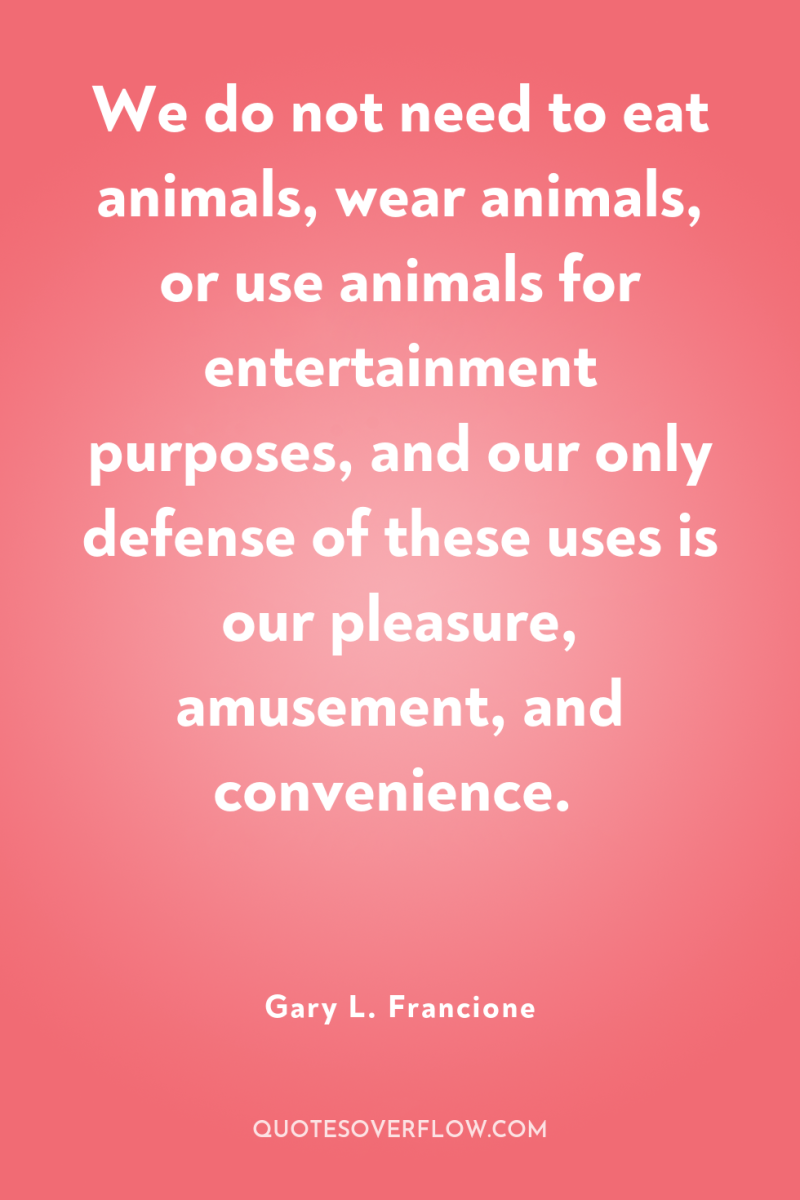
3
We do not need to eat animals, wear animals, or use animals for entertainment purposes, and our only defense of these uses is our pleasure, amusement, and convenience.Gary L. Francione
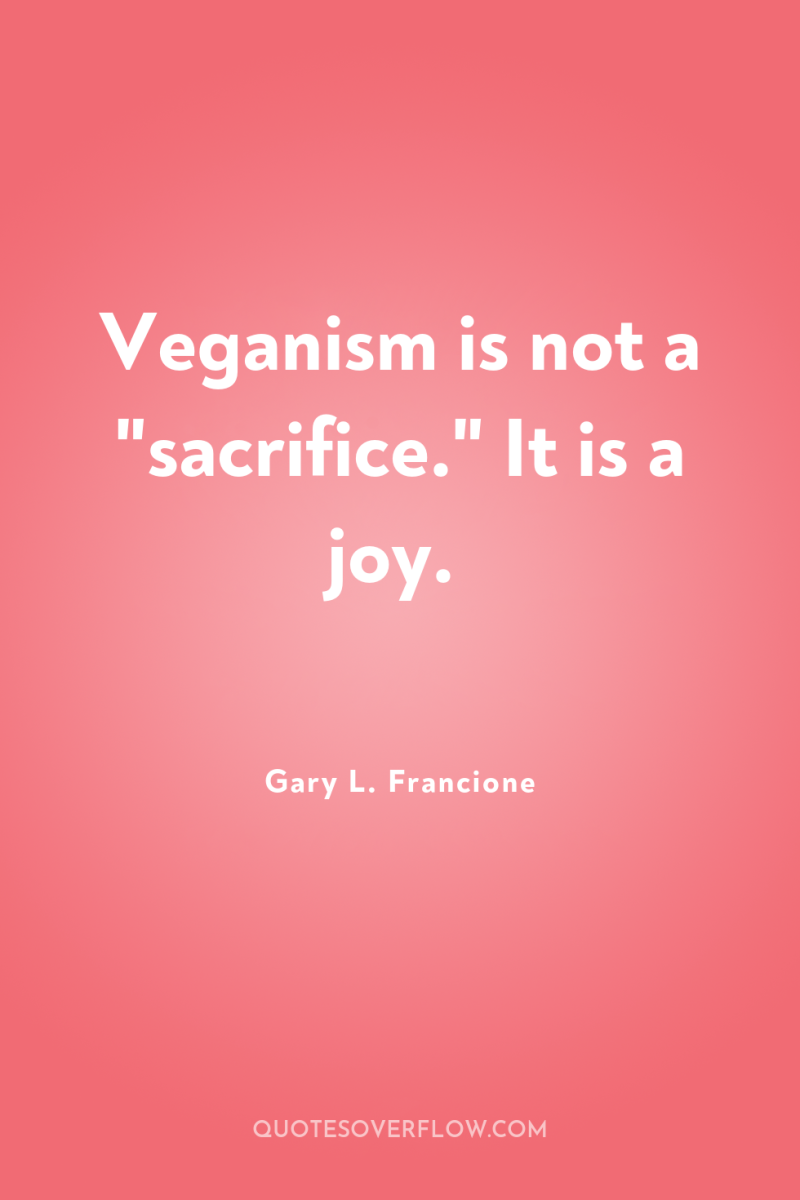
4
Veganism is not a "sacrifice." It is a joy.Gary L. Francione
5
If you are not vegan, please consider going vegan. It’s a matter of nonviolence. Being vegan is your statement that you reject violence to other sentient beings, to yourself, and to the environment, on which all sentient beings depend.Gary L. Francione
6
We should always be clear that animal exploitation is wrong because it involves speciesism. And speciesism is wrong because, like racism, sexism, homophobia, anti-semitism, classism, and all other forms of human discrimination, speciesism involves violence inflicted on members of the moral community where that infliction of violence cannot be morally justified. But that means that those of us who oppose speciesism necessarily oppose discrimination against humans. It makes no sense to say that speciesism is wrong because it is like racism (or any other form of discrimination) but that we do not have a position about racism. We do. We should be opposed to it and we should always be clear about that.Gary L. Francione
7
Veganism is an act of nonviolent defiance. It is our statement that we reject the notion that animals are things and that we regard sentient nonhumans as moral persons with the fundamental moral right not to be treated as the property or resources of humans.Gary L. Francione
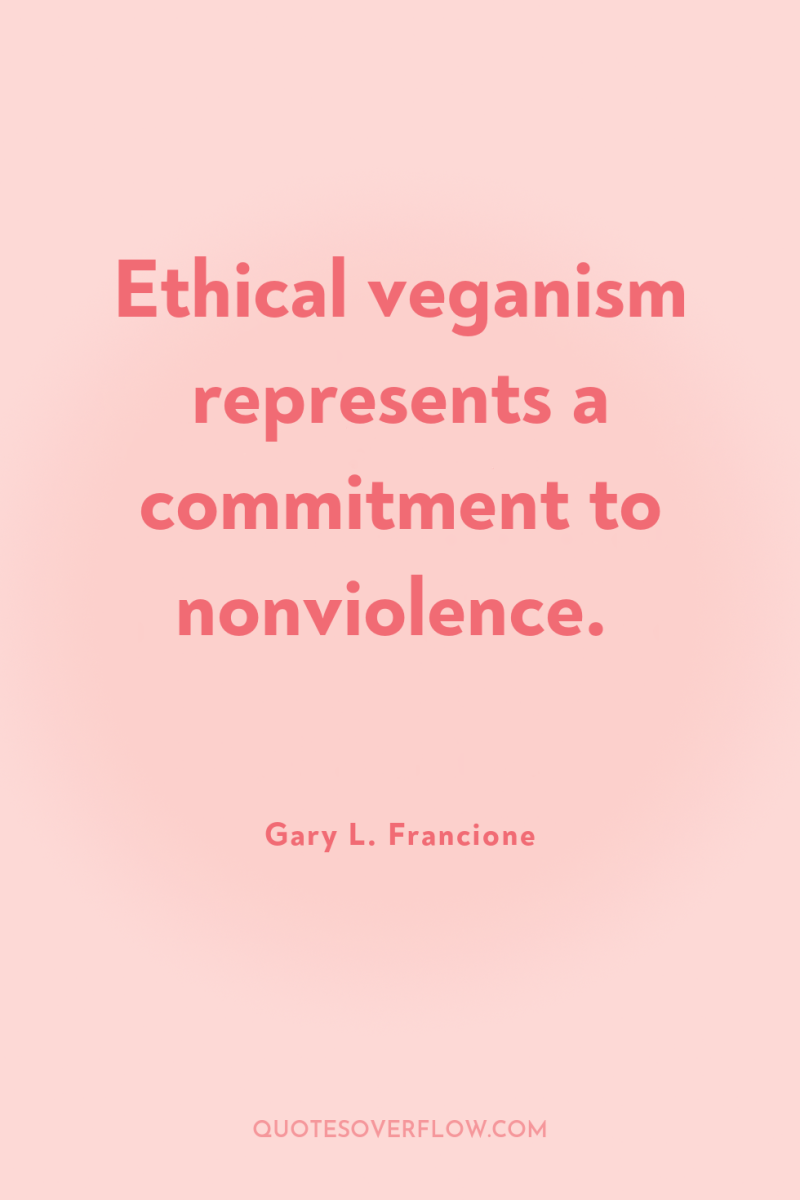
8
Ethical veganism represents a commitment to nonviolence.Gary L. Francione
9
I am opposed to animal welfare campaigns for two reasons. First, if animal use cannot be morally justified, then we ought to be clear about that, and advocate for no use. Although rape and child molestation are ubiquitous, we do not have campaigns for “humane” rape or “humane” child molestation. We condemn it all. We should do the same with respect to animal exploitation. Second, animal welfare reform does not provide significant protection for animal interests. Animals are chattel property; they are economic commodities. Given this status and the reality of markets, the level of protection provided by animal welfare will generally be limited to what promotes efficient exploitation. That is, we will protect animal interests to the extent that it provides an economic benefit.Gary L. Francione
10
To say that a being who is sentient has no interest in continuing to live is like saying that a being with eyes has no interest in continuing to see. Death–however “humane”–is a harm for humans and nonhumans alike.Gary L. Francione
11
I reject animal welfare reform and single-issue campaigns because they are not only inconsistent with the claims of justice that we should be making if we really believe that animal exploitation is wrong, but because these approaches cannot work as a practical matter. Animals are property and it costs money to protect their interests; therefore, the level of protection accorded to animal interests will always be low and animals will, under the best of circumstances, still be treated in ways that would constitute torture if applied to humans. By endorsing welfare reforms that supposedly make exploitation more “compassionate” or single-issue campaigns that falsely suggest that there is a coherent moral distinction between meat and dairy or between fur and wool or between steak and foie gras, we betray the principle of justice that says that all sentient beings are equal for purposes of not being used exclusively as human resources. And, on a practical level, we do nothing more than make people feel better about animal exploitation. .Gary L. Francione
12
Animals are property. There are laws that supposedly protect animal interestsin being treated “humanely, ” but that term is interpreted in large part to mean that we cannot impose “unnecessary” harm on animals, and that is measured by what treatment is considered as necessary within particular industries, and according to customs of use, to exploit animals. The bottom line is that animals do not have any respect-based rights in the way that humans have, because we do not regard animals as having any moral value. They have only economic value. We value their interests economically, and we ignore their interests when it is economically beneficial for us to do so. At this point in time, it makes no sense to focus on the law, because as long as we regard animals as things, as a moral matter, the laws will necessarily reflect that absence of moral value and continue to do nothing to protect animals. We need to change social and moral thinking about animals before the law is going to do anything more. .Gary L. Francione
13
So it is always preferable to discuss the matter of veganism in a non-judgemental way. Remember that to most people, eating flesh or dairy and using animal products such as leather, wool, and silk, is as normal as breathing air or drinking water. A person who consumes dairy or uses animal products is not necessarily or usually what a recent and unpopular American president labelled an "evil doer.Gary L. Francione
14
Any serious social, political, and economic change must include veganism.Gary L. Francione
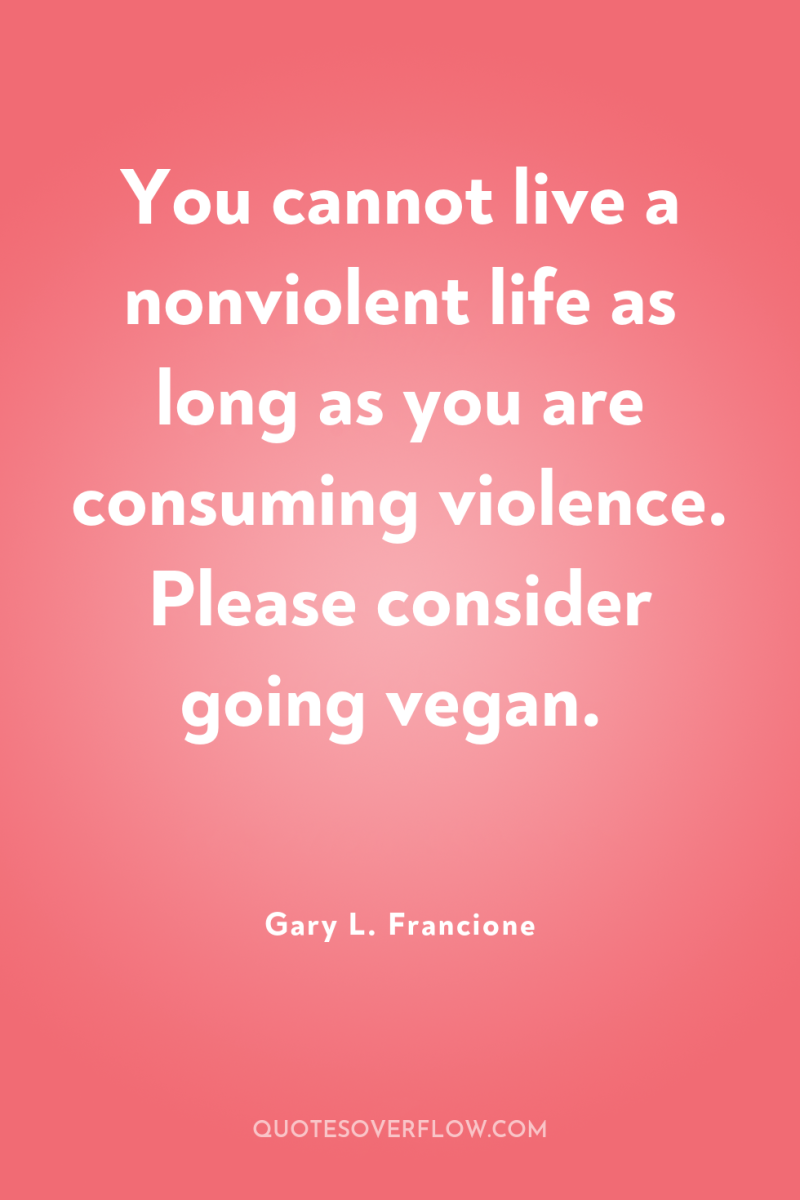
15
You cannot live a nonviolent life as long as you are consuming violence. Please consider going vegan.Gary L. Francione
16
Speciesism is morally objectionable because, like racism, sexism, and heterosexism, it links personhood with an irrelevant criterion. Those who reject speciesism are committed to rejecting racism, sexism, heterosexism, and other forms of discrimination as well.Gary L. Francione
17
If we take the position that an assessment that veganism is morally preferable to vegetarianism is not possible because we are all “on our own journey, ” then moral assessment becomes completely impossible or is speciesist. It is impossible because if we are all “on our own journey, ” then there is nothing to say to the racist, sexist, anti-semite, homophobe, etc. If we say that those forms of discrimination are morally bad, but, with respect to animals, we are all “on our own journey” and we cannot make moral assessments about, for instance, dairy consumption, then we are simply being speciesist and not applying the same moral analysis to nonhumans that we apply to the human context.Gary L. Francione
18
The notion that we should promote “happy” or “humane” exploitation as “baby steps” ignores that welfare reforms do not result in providing significantly greater protection for animal interests; in fact, most of the time, animal welfare reforms do nothing more than make animal exploitation more economically productive by focusing on practices, such as gestation crates, the electrical stunning of chickens, or veal crates, that are economically inefficient in any event. Welfare reforms make animal exploitation more profitable by eliminating practices that are economically vulnerable. For the most part, those changes would happen anyway and in the absence of animal welfare campaigns precisely because they do rectify inefficiencies in the production process. And welfare reforms make the public more comfortable about animal exploitation. The “happy” meat/animal products movement is clear proof of that. We would never advocate for “humane” or "happy” human slavery, rape, genocide, etc. So, if we believe that animals matter morally and that they have an interest not only in not suffering but in continuing to exist, we should not be putting our time and energy into advocating for “humane” or “happy” animal exploitation. .Gary L. Francione
19
There are some animal advocates who say that to maintain that veganism is the moral baseline is objectionable because it is “judgmental, ” or constitutes a judgment that veganism is morally preferable to vegetarianism and a condemnation that vegetarians (or other consumers of animal products) are “bad” people. Yes to the first part; no to the second. There is no coherent distinction between flesh and other animal products. They are all the same and we cannot justify consuming any of them. To say that you do not eat flesh but that you eat dairy or eggs or whatever, or that you don’t wear fur but you wear leather or wool, is like saying that you eat the meat from spotted cows but not from brown cows; it makers no sense whatsoever. The supposed “line” between meat and everything else is just a fantasy—an arbitrary distinction that is made to enable some exploitation to be segmented off and regarded as “better” or as morally acceptable. This is not a condemnation of vegetarians who are not vegans; it is, however, a plea to those people to recognize their actions do not conform with a moral principle that they claim to accept and that all animal products are the result of imposing suffering and death on sentient beings. It is not a matter of judging individuals; it is, however, a matter of judging practices and institutions. And that is a necessary component of ethical living.Gary L. Francione
20
We should never present flesh as somehow morally distinguishable from dairy. To the extent it is morally wrong to eat flesh, it is as morally wrong – and possibly more morally wrong – to consume dairyGary L. Francione
21
If we are ever going to see a paradigm shift, we have to be clear about how we want the present paradigm to shift. We must be clear that veganism is the unequivocal baseline of anything that deserves to be called an “animal rights” movement. If “animal rights” means anything, it means that we cannot morally justify any animal exploitation; we cannot justify creating animals as human resources, however “humane” that treatment may be. We must stop thinking that people will find veganism “daunting” and that we have to promote something less than veganism. If we explain the moral ideas and the arguments in favor of veganism clearly, people will understand. They may not all go vegan immediately; in fact, most won’t. But we should always be clear about the moral baseline. If someone wants to do less as an incremental matter, let that be her/his decision, and not something that we advise to do. The baseline should always be clear. We should never be promoting “happy” or “humane” exploitation as morally acceptable. .Gary L. Francione
22
An abolitionist is, as I have developed that notion, one who (1) maintains that we cannot justify animal use, however “humane” it may be; (2) rejects welfare campaigns that seek more “humane” exploitation, or single-issue campaigns that seek to portray one form of animal exploitation as morally worse than other forms of animal exploitation (e.g., a campaign that seeks to distinguish fur from wool or leather); and (3) regards veganism, or the complete rejection of the consumption or use of any animal products, as a moral baseline. An abolitionist regards creative, nonviolent vegan education as the primary form of activism, because she understands that the paradigm will not shift until we address demand and educate people to stop thinking of animals as things we eat, wear, or use as our resources.Gary L. Francione
23
The rights paradigm, which, as I interpret it, morally requires the abolition of animal exploitation and requires veganism as a matter of fundamental justice, is radically different from the welfarist paradigm, which, in theory focuses on reducing suffering, and, in reality, focuses on tidying up animal exploitation at its economically inefficient edges. In science, those who subscribe to one paradigm are often unable to understand and engage those who subscribe to another paradigm precisely because the theoretical language that they use is not compatible. I think that the situation is similar in the context of the debate between animal rights and animal welfare. And that is why welfarists simply cannot understand or accept the slavery analogy. .Gary L. Francione

24
In order to be a teacher you've got to be a student firstGary L. Francione
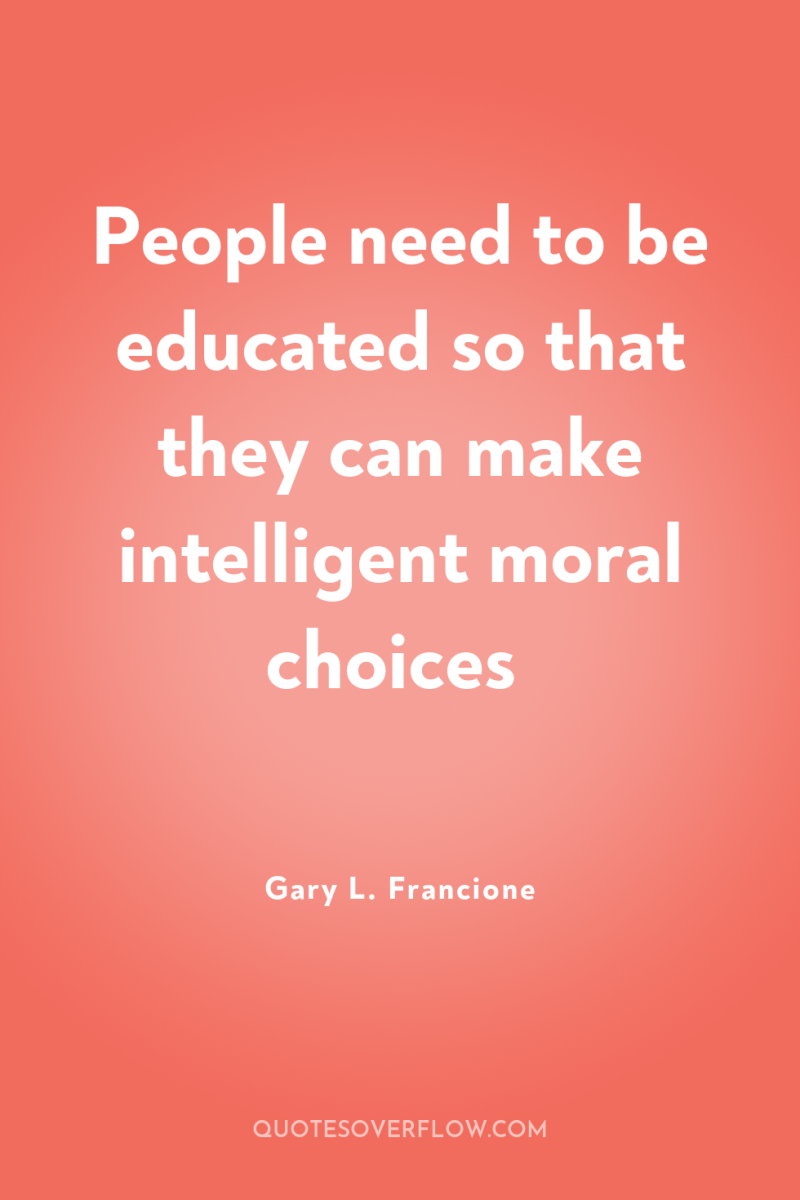
25
People need to be educated so that they can make intelligent moral choicesGary L. Francione
26
We proclaim human intelligence to be morally valuable per se because we are human. If we were birds, we would proclaim the ability to fly as morally valuable per se. If we were fish, we would proclaim the ability to live underwater as morally valuable per se. But apart from our obviously self-interested proclamations, there is nothing morally valuable per se about human intelligence.Gary L. Francione
27
All sentient beings should have at least one right–the right not to be treated as propertyGary L. Francione
28
Veganism is about nonviolence. It is about not engaging in harm to other sentient beings; to oneself; and to the environment upon which all beings depend for life. In my view, the animal rights movement is, at its core, a movement about ending violence to all sentient beings. It is a movement that seeks fundamental justice for all. It is an emerging peace movement that does not stop at the arbitrary line that separates humans from nonhumans.Gary L. Francione
29
Welfare reforms and the whole “happy” exploitation movement are not “baby steps.” They are big steps—in a seriously backward direction.Gary L. Francione
30
We cannot justify treating any sentient nonhuman as our property, as a resource, as a thing that we an use and kill for our purposes.Gary L. Francione
31
We should not be surprised that more and more people feel comfortable about consuming animal products. After all, they are being assured by the “experts” that suffering is being decreased and they can buy “happy” meat, “free-range” eggs, etc. These products even come with labels approved of by animal organizations. The animal welfare movement is actually encouraging the “compassionate” consumption of animal products. Animal welfare reforms do very little to increase the protection given to animal interests because of the economics involved: animals are property. They are things that have no intrinsic or moral value. This means that welfare standards, whether for animals used as foods, in experiments, or for any other purpose, will be low and linked to the level of welfare needed to exploit the animal in an economically efficient way for the particular purpose. Put simply, we generally protect animal interests only to the extent we get an economic benefit from doing so. The concept of “unnecessary” suffering is understood as that level of suffering that will frustrate the particular use. And that can be a great deal of suffering. Killing Animals and Making Animals Suffer | Animal Rights: The Abolitionist Approach .Gary L. Francione
32
If you are a feminist and are not a vegan, you are ignoring the exploitation of female nonhumans and the commodification of their reproductive processes, as well as the destruction of their relationship with their babies; If you are an environmentalist and not a vegan, you are ignoring the undeniable fact that animal agriculture is an ecological disaster; If you embrace nonviolence but are not a vegan, then words of nonviolence come out of your mouth as the products of torture and death go into it; If you claim to love animals but you are eating them or products made from them, or otherwise consuming them, you see loving as consistent with harming that which you claim to love. Stop trying to make excuses. There are no good ones to make. Go vegan. .Gary L. Francione
33
I have argued that this sort of thinking is problematic in at least two regards: First, the notion that nonhuman animals do not have an interest in continued existence–that they do not have an interest in their lives–involves relying on a speciesist concept of what sort of self-awareness matters morally. I have argued that every sentient being necessarily has an interest in continued existence–every sentient being values her or his life–and that to say that only those animals (human animals) who have a particular sort of self-awareness have an interest in not being treated as commodities begs the fundamental moral question. Even if, as some maintain, nonhuman animals live in an “eternal present”–and I think that is empirically not the case at the very least for most of the nonhumans we routinely exploit who do have memories of the past and a sense of the future–they have, in each moment, an interest in continuing to exist. To say that this does not count morally is simply speciesist. Second, even if animals do not have an interest in continuing to live and only have interests in not suffering, the notion that, as a practical matter, we will ever be able to accord those interests the morally required weight is simply fantasy. The notion that we property owners are ever going to accord any sort of significant weight to the interests of property in not suffering is simply unrealistic. Is it possible in theory? Yes. Is it possible as a matter of practicality in the real world. Absolutely not. Welfarists often talk about treating “farmed animals” in the way that we treat dogs and cats whom we love and regard as members of our family. Does anyone really think that is practically possible? The fact that we would not think of eating our dogs and cats is some indication that it is not.Gary L. Francione
34
One of the main arguments that I make is that although almost everyone accepts that it is morally wrong to inflict “unnecessary” suffering and death on animals, 99% of the suffering and death that we inflict on animals can be justified only by our pleasure, amusement, or convenience. For example, the best justification that we have for killing the billions of nonhumans that we eat every year is that we enjoy the taste of animal flesh and animal products. This is not an acceptable justification if we take seriously, as we purport to, that it is wrong to inflict unnecessary suffering or death on animals, and it illustrates the confused thinking that I characterize as our “moral schizophrenia” when it comes to nonhumans. A follow-up question that I often get is: “What about vivisection? Surely that use of animals is not merely for our pleasure, is it?” Vivisection, Part One: The “Necessity” of Vivisection | Animal Rights: The Abolitionist Approach.Gary L. Francione
35
Forty-two years after Dr. King was murdered, we are still a nation of inequality. People of color, women, gays, lesbians, and others are still treated as second-class citizens. Yes, things have changed but we have still not achieved equality among all humans. And nonhuman animals continue to be chattel property without any inherent value.Gary L. Francione
36
Every time you drink a glass of milk or eat a piece of cheese, you harm a mother. Please go vegan.Gary L. Francione
37
When it comes to animal agriculture, there is conventional, which is really hideous, and "compassionate" or "certified humane" or whatever, which *may* be *slightly* less hideous. But it's all torture. It's all wrong. These "happy" gimmicks are just designed to make the public feel better about exploiting animals. Don't buy the propaganda of "happy" exploitation. Go vegan and promote veganism.Gary L. Francione
38
Just as we reject racism, sexism, ageism, and heterosexism, we reject speciesism. The species of a sentient being is no more reason to deny the protection of this basic right than race, sex, age, or sexual orientation is a reason to deny membership in the human moral community to other humans.Gary L. Francione
39
There is increasing social concern about our use of nonhumans for experiments, food, clothing and entertainment. This concern about animals reflects both our own moral development as a civilization and our recognition that the differences between humans and animals are, for the most part, differences of degree and not of kind.Gary L. Francione
40
There is no 'need' for us to eat meat, dairy or eggs. Indeed, these foods are increasingly linked to various human diseases and animal agriculture is an environmental disaster for the planet.Gary L. Francione